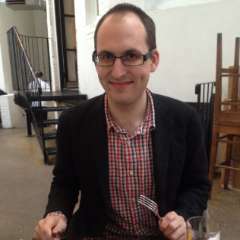Messiah is an eminently moveable feast. There are around ten different performing versions, and each time Advent rolls around you can see it in wildly varying configurations: big band modern instruments with massed ranks of choristers, both professional and amateur, or from concentrated versions from professional chamber choirs like Polyphony. This time we saw just ten singers and twelve instrumentalists (no woodwinds, only the silvery athleticism of strings, trumpets and drums) crammed onto Wigmore Hall’s tiny stage in the shape of Dunedin Consort, truly Green Berets of this repertoire, led from the keyboard by John Butt.
They were arrayed at the very front of the stage, Butt cueing them over his shoulder. The effect was startling, not least thanks to Dunedin’s briny, invigorated sound, where it sounds as if the singers have just stepped on a rake. The energy of choruses like “He Trusted in God” was hugely intensified, unmediated by the usual chasm between conductor and chorus. You could literally see the counterpoint in “He shall purify” rippling across the ensemble. As a consequence the piece felt hugely singer-led, with Butt’s role coordinating the bubbling and varied instrumental textures with the soloistic singing of the choristers. Part Two’s passion sequence – “Surely he hath borne our griefs” – was stacked high with pathos; “Unto us a child is born” sprang off the stage.
Another advantage of Dunedin’s approach was in razoring what can be a rather long evening to the finest, sharpest edges. Numbers segued directly from solo to chorus, with nary a break and fluid movement from seat to stage dovetailing the thing into one expressive whole, whose momentum gathers (in spite of some of Part Three's longueurs.) There was no awkward shuffling up and down as the chorus settles and soloists are roused from their mid-oratorio slumber to bash out some recitative.
To speak of soloists in this dynamic context is too crude, but performances were remarkable across the board, not least for reasons of stamina. Tenor Nicholas Mulroy is probably the closest thing the work has to a consistent narrator and was particularly effective in the despairing recitatives of Part Two, plunging gutturally on “neither found he any to comfort him”. Countertenor Owen Willetts had a velvety, luxurious voice – all sorts of warm mulling spices in his lower register for “But who may abide” – which got a vigorous workout in the declamatory middle sequence of “He was despised” and the spiky coloratura of the refiner’s fire.
Soprano Mhairi Lawson was fresh and gleaming throughout, eating up the coloratura in the (traditional) 4/4 version of “Rejoice Greatly” like they were cornflakes; the excitement in her Part One narration sequence was palpable. Bass Robert Davies was suave and glowering in his accompanied recitatives, with boldly defined coloratura in “Why Do the Nations”; the B section of “The trumpet shall sound” was remarkably lucid given the marathon nature of this performance.
Instrumental forces, headed by the irrepressible HIP specialist Matthew Truscott, were gusty and vibrant. The string cascades in “For unto us a child is born” sparkled like tinsel at the work disco you won’t be attending this year. The trumpet solo from Paul Sharp – always a squeaky-bum moment for performers and audiences – in “The trumpet shall sound” was faultlessly in tune and dashingly noble. Stephen Burke’s hard-headed timpani sticks thundered in the Hallelujah Chorus and Part Three’s final peroration. The audience didn’t get to their feet in the former – Covid nervousness, perhaps? – but couldn’t help themselves after the final bracing chord: a huge ovation for a thrilling performance that gave this staple a vigorous makeover.


